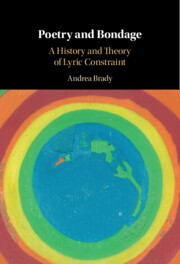Book contents
- Poetry and Bondage
- Poetry and Bondage
- Copyright page
- Dedication
- Contents
- Illustrations
- Acknowledgements
- Introduction The Fetters of Verse
- Part I Lyric Cells
- Part II The Songs of Slavery
- Part III Pleasures and Ornaments
- Chapter 9 A New Made Wound
- Chapter 10 The Ecstatic Lash of the Poetic Line
- Chapter 11 Soft Architecture
- Chapter 12 Silken Fetters
- Index
Chapter 10 - The Ecstatic Lash of the Poetic Line
Swinburne, Hopkins and the Pleasures of Bondage
from Part III - Pleasures and Ornaments
Published online by Cambridge University Press: 08 October 2021
- Poetry and Bondage
- Poetry and Bondage
- Copyright page
- Dedication
- Contents
- Illustrations
- Acknowledgements
- Introduction The Fetters of Verse
- Part I Lyric Cells
- Part II The Songs of Slavery
- Part III Pleasures and Ornaments
- Chapter 9 A New Made Wound
- Chapter 10 The Ecstatic Lash of the Poetic Line
- Chapter 11 Soft Architecture
- Chapter 12 Silken Fetters
- Index
Summary
In Masoch’s novel Venus in Furs, three ‘Negresses’ magically appear at the moment that the speaker signs away his legal rights to life. This fantasy is an example of how actual bondage and historical slavery shape the sadomasochistic imagination. This chapter traces that imagination through poems by Algernon Charles Swinburne and Gerard Manley Hopkins, written at the height of Victorian sexology. It looks at the metaphor of the plough or the ploughman in relation to bondage and Hopkins’s class politics, and at the flagellation fantasies in Swinburne’s poetry (including his juvenile compositions), and the way that those poems fetishise the foot, mouth and ‘bum’. It discusses the theatricality and suspension of agency involved in masochism in relation to specific examples of colonial violence, to challenge the idea that the voluntary submission to constraint in radical sex practices can undermine forms of social domination.
Keywords
- Type
- Chapter
- Information
- Poetry and BondageA History and Theory of Lyric Constraint, pp. 311 - 349Publisher: Cambridge University PressPrint publication year: 2021

